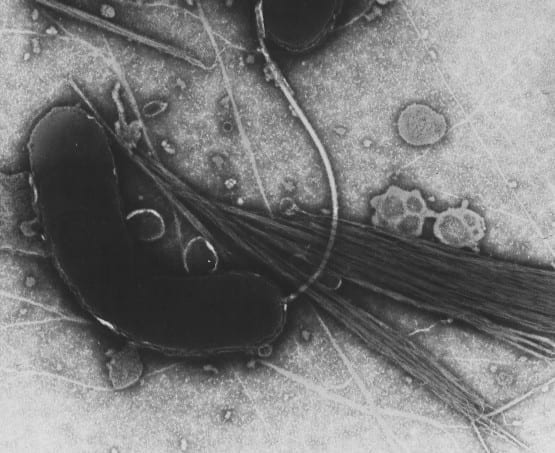
Can scientists rid malaria from the Third World by simply feeding algae genetically engineered with a vaccine?
That’s the question biologists at UC San Diego sought to answer after they demonstrated last May that algae can be engineered to produce a vaccine that blocks malaria transmission. In a follow up study, published online today in the scientific journal Applied and Environmental Microbiology, they got their answer: Not yet, although the same method may work as a vaccine against a wide variety of viral and bacterial infections.
In their most recent study, which the authors made freely available on the Applied and Environmental Microbiology website at http://aem.asm.org, the researchers fused a protein that elicits an antibody response in mice against the organism that causes malaria, Plasmodium falciparum, which afflicts 225 million people worldwide, with a protein produced by the bacterium responsible for cholera, Vibrio cholera, that binds to intestinal epithelial cells. They then genetically engineered algae to produce this two-protein combination, or “fusion protein,” freeze dried the algae and later fed the resulting green powder to mice. The researchers hypothesized that together these proteins might be an effective oral vaccine candidate when delivered using algae.
The result? The mice developed Immunoglobulin A (IgA) antibodies to both the malarial parasite protein and to a toxin produced by the cholera bacteria. Because IgA antibodies are produced in the gut and mucosal linings, they don’t protect against the malarial parasites, which are injected directly into the bloodstream by mosquitoes. But their study suggests that similar fusion proteins might protect against infectious diseases that affect mucosal linings using their edible freeze-dried algae.
“Many bacterial and viral infections are caused by eating tainted food or water,” says Stephen Mayfield, a professor of biology at UC San Diego who headed the study. “So what this study shows is that you can get a really good immune response from a recombinant protein in algae that you feed to a mammal. In this case, it happens to be a mouse, but presumably it would also work in a human. That’s really encouraging for the potential for algae-based vaccines in the future.”
The Latest Bing News on:
Medical Uses for Algae
- Is Algae Oil the New Fish Oil?on April 30, 2024 at 10:35 am
Could something as repulsive sounding as oil made from algae really have enough health benefits to blow up on the internet? Avery Zenker, R.D., with Everflex Fitness in Calgary, Alberta, Canada, says ...
- Everything You Need to Know About Algae Oilon April 30, 2024 at 10:35 am
“Algae oil can also have benefits for the skin,” says Zenker, citing this research. “Omega-3 fatty acids help maintain the skin's integrity, reduce the effects of aging, and may improve conditions ...
- Algae-based Animal Feeds Market to Hit US$ 8,158.1 Million by 2033, Reports Future Market Insights, Inc.on April 30, 2024 at 2:02 am
The net revenue generated from the sales of animal feed worldwide was figured out to be around US$ 4,230.7 million by 2022 end. The demand for algae-based animal feed and components is anticipated to ...
- Algae Protein Market to Be Worth $709M by 2028 as Demand for Sustainable Proteins Increaseson April 28, 2024 at 9:29 pm
According to a report by Allied Market Research, the global algae protein market will be worth $709 million by 2028, up from $361.4 million in 2020. The ...
- Top 8 Best Red Algae Supplements in 2024on April 27, 2024 at 5:00 pm
The popularity of red algae-derived supplements is on the rise, thanks to the numerous potential health benefits they provide. Red algae, also known as Rhodophyta, fall under a group of seaweed ...
- Top 7 Best Blue Green Algae Supplements in 2024on April 27, 2024 at 5:00 pm
Recently, there’s been a spike in the popularity of blue-green algae supplements due to the numerous health benefits they offer. These freshwater algae, rich in proteins, vitamins, and ...
- Another blue-green algae health alert issued along Caloosahatcheeon April 27, 2024 at 9:13 am
The Florida Department of Health in Lee County has issued its fifth health alert this year, four of which have been due to blue-green algae in the Caloosahatchee River.
- Investing in the Growing Algae-Based Supplements Market: Projected Valuation of US$ 4,804.5 Million by 2034 with 7.3% CAGR | FMI Projectionon April 23, 2024 at 11:50 pm
Algae-Based Supplement Market The market size for algae-based supplements is estimated to be around US$ 2,365.3 million in 2024. It is projected to exhibit a CAGR of 7.3% over the forecast period and ...
- Pasco County Issues Health Alert For Blue-Green Algal In Dowling Lake-North And Blanton Lakeon April 23, 2024 at 6:46 am
PASCO COUNTY, Fla. - The Florida Department of Health in Pasco County has issued a Health Alert for harmful blue-green algal toxins in Dowling Lake-North and ...
- Algae Products Market: Carotenoids and Blue-Green Algae See Strong Growthon April 23, 2024 at 6:30 am
The Algae Products Market is Booming and is Expected to Reach $7.3 Billion by 2028 at a compound annual growth rate [CAGR] of 6.4%!Chicago, April 23, 2024 (GLOBE NEWSWIRE) -- The algae products market ...
The Latest Google Headlines on:
Medical Uses for Algae
[google_news title=”” keyword=”Medical Uses for Algae” num_posts=”10″ blurb_length=”0″ show_thumb=”left”] [/vc_column_text]The Latest Bing News on:
Edible Malarial Vaccine
- R21 Anti-Malaria Vaccine: A Breakthrough in the Fight Against a Deadly Diseaseon April 27, 2024 at 11:12 pm
Anti-malaria medication only lasts for days and parasites are building up resistance against these drugs as well.There are about 40 million children born every year in malaria areas in Africa who ...
- Three more African nations roll out malaria vaccineon April 25, 2024 at 10:40 am
Three more African countries have joined a rollout of malaria vaccines targeting millions of children in a continent that accounts for 95 percent of malaria deaths, the UN said Thursday.
- Vaccines are a glimmer of hope against malaria, but the battle has only just begunon April 25, 2024 at 6:10 am
In the quest for a vaccine, scientists have faced a Herculean challenge. The malaria parasite is a cunning shapeshifter, adept at evading the human immune system. Moreover, successfully ...
- Vaccines are a glimmer of hope against malaria, but the battle has only just begunon April 25, 2024 at 6:10 am
By the time you reach the end of this article, three children will have died from malaria – a disease that casts a dark shadow over nearly half of the world’s population, claiming victims ...
- Malaria is still killing people in Kenya, but a vaccine and local drug production may helpon April 25, 2024 at 12:17 am
Malaria is still a significant public health challenge in Kenya, but an important pilot of the world’s first malaria vaccine may help.
- Two new malaria vaccines are being rolled out across Africa: How they work and what they promiseon April 23, 2024 at 11:40 am
Malaria incidents are on the rise. There were 249 million cases of this parasitic disease in 2022, 5 million more than in 2021. Africa suffers more than any other region from malaria, with 94% of ...
- A Tennessee bill doesn’t ban vaccines from being pumped into the food supplyon April 10, 2024 at 5:00 pm
It does not ban vaccines from food. Edible vaccines, which are administered through food, have been in development since the 1990s but are not approved for use anywhere in the world. Learn more ...
- Malaria Vaccine: Why is it Taking so Long?on April 9, 2024 at 5:00 pm
Vaccines against malaria have been the object of constant endeavor by the scientific community and pharmaceutical industries for over three decades, with little success so far. Hopes for ...
- Tennessee Moves to Classify 'Vaccine Lettuce' as a Drugon April 1, 2024 at 7:02 am
Lawmakers in Tennessee have passed a bill that would treat edible vaccines, such as those... Lettuce grows under artificial lights on an automated growing rack at a farm in Nottingham, Maryland ...
- New malaria vaccine could drastically reduce child deaths, say scientistson September 7, 2022 at 3:36 pm
A malaria vaccine created by Oxford researchers “is really exciting” and could contribute towards drastically reducing the number of children who die from the infection, experts suggest.
The Latest Google Headlines on:
Edible Malarial Vaccine
[google_news title=”” keyword=”Edible Malarial Vaccine” num_posts=”10″ blurb_length=”0″ show_thumb=”left”]










